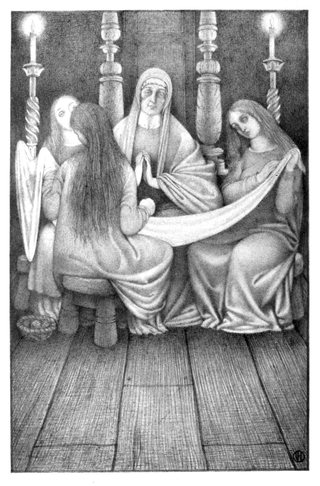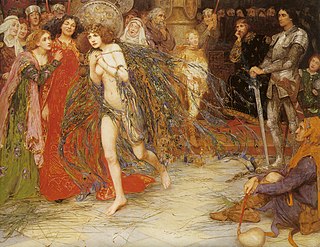"Sheath and Knife" (Roud 3960, [1] Child 16) is a folk ballad. [2]
"Sheath and Knife" (Roud 3960, [1] Child 16) is a folk ballad. [2]
A woman is pregnant with her brother's child. He takes her to the greenwood to have her child, but she dies (or he kills her at her request). He buries her and laments her death.
"Leesome Brand", Child ballad 15, is closely related to this ballad, and some variants are hard to distinguish; [3] the hero laments the death in the same language as "Sheath and Knife".
Other ballads on this theme include "The Bonny Hind", "The King's Dochter Lady Jean", and "Lizie Wan". [4]

Sir Lionel is the younger son of King Bors of Gaunnes and Evaine and brother of Bors the Younger in Arthurian legend since the Lancelot-Grail cycle. He is a double cousin of Lancelot and cousin of Lancelot's younger half-brother Hector de Maris. He later became the subject of one of the famous Child Ballads (#18).
The Famous Flower of Serving-Men or The Lady turned Serving-Man is a traditional English language folk song and murder ballad. Child considered it as closely related to the ballad "The Lament of the Border Widow" or "The Border Widow's Lament".
"Unusually, it is possible to give a precise date and authorship to this ballad. It was written by the prolific balladeer, Laurence Price, and published in July 1656, under the title of The famous Flower of Serving-Men. Or, The Lady turn'd Serving-Man. It lasted in the mouths of ordinary people for three hundred years: what a tribute to the work of any writer, leave alone the obscure Laurence Price. Oral tradition, however, has made changes. The original has twenty-eight verses and a fairy-tale ending: “And then for fear of further strife, / he took Sweet William to be his Wife: / The like before was never seen, / A Serving-man to be a Queen”. - Roy Palmer, A Book of British Ballads

"Hind Horn" is a traditional English and Scottish folk ballad.
"Hind Etin" is a folk ballad existing in several variants.

"Lord Thomas and Fair Annet", also known as "Lord Thomas and Fair Eleanor", is an English folk ballad.
"The Twa Magicians", "The Two Magicians", "The Lady and the Blacksmith", or "The Coal Black Smith" is a British folk song. It first appears in print in 1828 in two sources, Peter Buchan's Ancient Ballads and Songs of the North of Scotland and John Wilson's Noctes Ambrosianae #40. It was later published as number 44 of Francis James Child's English and Scottish Popular Ballads. During the 20th century, versions of it have been recorded by a number of folk and popular musicians.
"Rose the Red and White Lily" is Child ballad number 103.
"The Fair Flower of Northumberland" is a folk ballad.
Leesome Brand is Child Ballad number 15 and Roud #3301.

"The Boy and the Mantle" is Child ballad number 29, an Arthurian story.
"The Bonny Hind" is Child ballad number 50.
Lord Lovel is number 75 of the ballads anthologized by Francis James Child during the second half of the 19th century, and exists in several variants. This ballad is originally from England, originating in the Late Middle Ages, with the oldest known versions being found in the regions of Gloucestershire, Somerset, Worcestershire, Warwickshire, and Wiltshire.
"Gil Brenton" is Child ballad 5, Roud 22, existing in several variants.
"The Knight and the Shepherd’s Daughter" is an English ballad, collected by Francis James Child as Child Ballad 110 and listed as number 67 in the Roud Folk Song Index.
Erlinton is #8 of the Child Ballads, the collection of 305 ballads from England and Scotland, and their American variants, collected by Francis James Child in the late nineteenth century. The collection was published as The English and Scottish Popular Ballads between 1882 and 1898 by Houghton Mifflin in ten volumes and later reissued in a five volume edition.
"Earl Brand" is a pseudo-historical English ballad.
"King Henry" is Child ballad 32, Roud 3967.
Sweet William's Ghost is an English Ballad and folk song which exists in many lyrical variations and musical arrangements. Early known printings of the song include Allan Ramsay's The Tea-Table Miscellany in 1740 and Thomas Percy's Reliques of Ancient English Poetry in 1765. Percy believed that the last two stanzas of the version he published were later additions, but that the details of the story they recounted were original.
"Lizie Wan" is Child ballad 51 and a murder ballad. It is also known as "Fair Lizzie".

"The Twa Brothers" is a traditional ballad existing in many variants.